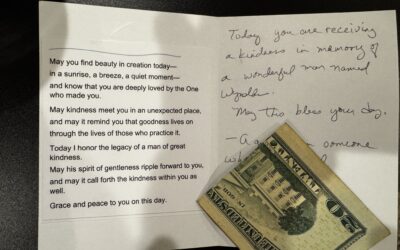Wesley’s definition of salvation was more than a way to gain eternal life after death. To Wesley, salvation included the present deliverance from sin, a soul restored to its original purity before the fall of humankind, and access to the divine nature of God enabling one to become as they were intended when created.[1] He termed the regaining of the divine nature “full salvation,” while “salvation” referred to the process in that recovery.[2]
Grace, for many reformers, was limited to those whom God chose and was needed because of humankind’s depravity since birth. In contrast, Wesley believed that grace was available for all and that a Christian, through the power of God’s love and His Holy Spirit, could reach a goal of perfection in love. His theology brought “hope, [and] a promise of new creation in the midst of this present age.”[3] Thus, Wesley’s view of the transforming power of God’s Spirit offered an optimistic view of grace which had great appeal to his followers.
John Wesley’s parents, Samuel and Susanna, had an immense influence on his spiritual growth. “High Church” Anglicans,[4] they were also influenced by Susanna’s Puritan parents who practiced a more “vibrant spirituality centered in the daily reading of scripture and prayer.”[5] Thus, John received from his parents the mix of Anglican conformity and Puritan spirituality.
Wesley’s understanding of what it means to be a Christian began when he started reading works in the “holy living” tradition. Kempis’ spiritual classic, The Imitation of Christ, had a profound influence on him, showing him that Christianity was an inward religion of whole-hearted devotion.[6] Five years later, as he read the Serious Call to a Devout and Holy Life and Christian Perfection by his older contemporary, William Law, he was more determined than ever to be completely devoted to God.[7] These books, however, also gave him a theological misunderstanding of his salvation being dependent on his own efforts to keep God’s law.[8]
John and Charles Wesley’s regular meeting (along with one or two others) for prayer and study in Oxford led to the formation of what detractors would call the “Holy Club.”[9] Not only did they regularly meet for study and prayer, but one of the members encouraged the group to join him in his visitation to the prisons and his service to the poor. These disciplines and services contributed greatly to their understanding of the practice of Christianity. When John Clayton joined the Holy Club, his interest in primitive Christianity was contagious to John Wesley and the group began regular fast days. This focus on primitive Christianity influenced Wesley’s focus on holiness, unity, charity, and devotional disciplines of the early church.[10]
Wesley’s missionary trip to Georgia, in my opinion, was by no means a failure. He had personal and theological breakthroughs as a result of this trip. His belief in the importance of the small group societies for Christian growth was reinforced as well as his awareness of the power of hymnody to Christian worship and formation. He also began to recognize that different forms of liturgy and discipline were used in primitive Christianity.[11] This moved him from a legalistic pursuit of righteousness to a more heartfelt and Spirit-led focus on apostolic faith, life, and mission.[12] His journey across the Atlantic even before reaching Georgia had far-reaching impact because of the life and faith of the Moravian Pietists. Their teachings had a profound impact on his understanding of assurance of salvation through God’s grace.
Wesley’s encounter with German Pietism eventually provided the answers to the anguish in his heart concerning his salvation. Wesley saw the assurance and peace of the Pietists amidst violent storms in route to Georgia, and he knew this was something he needed. I do think that the term Anglican Pietist would be an accurate description of Wesley. His deep roots with Anglicanism held sway on some of his theology, though Pietism brought to focus the missing link he was seeking in the view of holiness and the work of the Spirit. Already, some of the practices of pietism were part of Wesley’s reformed Anglican theology. He held to the use of societies, disciplinary spiritual practices, and belief in missions and compassion even before he met German Pietists.
Before the meeting in Aldersgate, Wesley had been questioning his theology on faith and assurance. Peter Boehler had taught Wesley that faith and salvation came instantaneously as a gift from God[13]and that faith in Christ resulted in victory over sin and peace from forgiveness.[14]During the meeting on Aldersgate Street Wesley experienced a warm feeling of assurance of his salvation.[15] This assurance had been missing and was a freeing, life-changing experience, giving personal peace and shifting his theology, which would further shift over time.
The Fetter Lane controversy centered on the “stillness” doctrine based on Psalm 45:10.[16] The Moravians taught that one is to “be still,” to wait for Christ apart from all means of grace; otherwise they would be trusting in themselves, not in Christ.[17] “Stillness” denied that grace is mediated through any practices ordained by Christ.[18]This teaching was in opposition to the means of grace Wesley had ordained concerning faith and works.
“Enthusiasm” was considered an experiential gospel that was misleading as opposed to a religion that was rational and moderate, which Wesley saw as “formalism.” He believed the Moravian “enthusiasm” was too often an unmediated experiential religion while he felt “formalism” was an assent to belief in Christ while lacking the power of a changed life.[19]
Wesley denied the dichotomy between reason and experience and between immediate and mediated experience. His response of “mediated immediacy” taught that inspiration, though always immediate, is normally through means.[20] He espoused that to use means of grace such as the Lord’s Supper without some degree of faith is formalism and does not lead to holiness; however, when these are accompanied by receptive faith they are the means by which one encounters the transforming presence of God. This was Wesley’s description of mediated immediacy in the means of grace, received by faith.[21]
Wesley’s journey of faith is a journey toward personal and theological integrity. He did not find peace when his inner thoughts and turmoil did not match his professed faith. He believed life and doctrine should influence each other at their core. Though he experienced troubles, heartbreak, faith battles, sins, and doubts, instead of giving up he continued his journey. He was not “married” to his own theological conclusions but continued to seek, learn, and adjust his theology as he matured in the faith. I admire his desire for integrity to match his theology and life. This is important to me. If my Christian theology does not inform my way of life it is merely a token belief. If my life does not match my theology, I am hypocritical. I long to be a learner until my dying day. I know this will continually cause adjustments in my theology and thinking, but I believe learning brings me closer to Christ. I admire the way Wesley learned, intellectual as he was, and continued to be a learner and seeker while adjusting as he learned. I respect the ways he sought input from others when he saw qualities he lacked, as well as the ways when he disagreed, he sought to discuss and find truth. Though he held to belief in the final authority of the Scriptures, it was obvious he observed God at work in his life and in the lives of others as well. He viewed experiences which deepened his faith as experiences from God, thus was open and observant to the Spirit of God at work in his life. I long to be more keenly aware of God’s Spirit at work in my life.
Bibliography
[1] Knight, Henry H. III, John Wesley: Optimist of Grace (Eugene, Oregon: Cascade Books, 2018), xiii.
[2] Ibid.
[3] Ibid., xv.
[4] Ibid., 1.
[5] Ibid., 3.
[6] Knight, 4.
[7] Ibid., 5.
[8] Ibid., 6.
[9] Ibid., 5.
[10]Ibid., 6.
[11]Ibid., 14.
[12] Knight, 14.
[13] Ibid., 19.
[14] Ibid., 21
[15] Ibid., 20-21.
[16] Ibid., 25.
[17] Knight, 26.
[18] Ibid.
[19] Ibid., 27-28.
[20] Ibid., 29.
[21] Ibid.



0 Comments